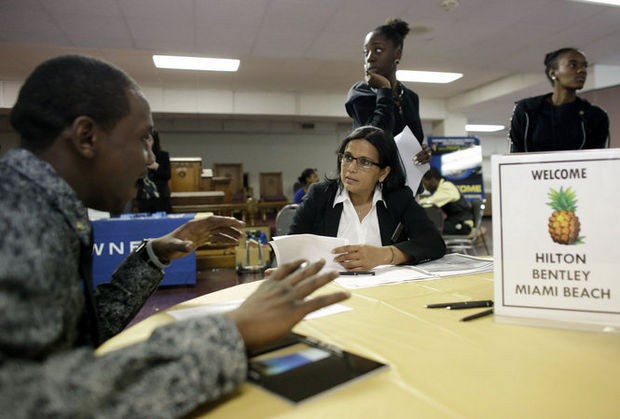US Jobs Figures Fail to Shore up World Markets
Post on: 25 Июнь, 2015 No Comment

A strong set of U.S. jobs data Friday failed to shore up confidence in world markets following days of extreme volatility amid mounting fears that Europe’s debt crisis could spread and derail the global economic recovery.
In Britain, where investors were grappling with uncertain general election results, the FTSE 100 index was down 108.48 points, or 2.1 percent, at 5,152.51, while the pound oscillated wildly.
Germany’s DAX fell 105.24 points, or 1.8 percent, at 5,800.02 while the CAC-40 in France was 79.91 points, or 2.3 percent, lower at 3,476.20.
And on Wall Street, the Dow Jones industrial average was down 59.85 points, or 0.6 percent, at 10,460.47 soon after the open while the broader Standard & Poor’s 500 index fell 11.04 points, or 1,117.11.
There had been hopes that Wall Street would open higher after strong U.S. jobs data helped push other concerns, primarily centered on Europe’s debt crisis, aside for a while.
Figures from the U.S. Labor Department showed that employers expanded payrolls by 290,000. That’s the most in four years and more than the 200,000 anticipated. However, the jobless rate rose to 9.9 percent from 9.7 percent, mainly because 805,000 jobseekers perhaps feeling better about their prospects resumed their searches for work.
Though the data showed the U.S. economy started the second quarter of the year robustly, economists warned that the debt crisis, among other issues, could change everything.
There are still major risks to the global economy from the sovereign debt crisis in the eurozone and high unemployment acting as a drag on consumer spending in the U.S., said Charles Davis, senior economist at the Centre for Economic and Business Research.
Davis also said that there was a risk that the U.S. Federal Reserve may start to raise interest rates earlier than planned, possibly as soon as the third quarter of 2010, if the jobs outlook continues to improve the threat higher borrowing costs causes jitters in the markets.
Friday’s stock market declines come a day after dramatic events on Wall Street, when a trading error had pushed the Dow Jones industrial average down 1,000 points at one stage, though it did recover to end only 347.8 points lower.
The primary focus in the markets though remains on whether the trouble in the eurozone will spread from Greece.
Many economists say Greece may be insolvent in the end despite an EU-IMF bailout, and there are fears that other countries will face bond market skepticism and higher borrowing costs that will worsen their finances in a vicious spiral. That could undermine markets and consumer confidence just as Europe crawls out of recession.
Finance ministers from the Group of Seven nations are holding a teleconference to discuss the situation, Japan’s finance minister Naoto Kan said.
Stock markets weren’t alone in seeing massive swings in the currency markets, the dollar was down a massive 6 yen at 88.68 yen one stage, while the euro dropped to $1.2520, its lowest level in 14 months. The retreats were reversed though and the dollar was trading 0.8 percent higher on the day at 91.49 yen while the euro was up 0.2 percent at $1.2658.
Contagion has smashed risk appetite and created panic while a ‘fat finger’ glitch has created mayhem in equities, said Neil Mackinnon, global macro strategist at VTB Capital.
Caution remains the watchword especially in front of the G7 conference call where markets will be wary of support/intervention action, said Mackinnon.
As if all that wasn’t enough, investors, particularly in London, had to grapple with the inconclusive outcome of the British general election.
With the counting of the votes coming to an end, it’s clear than no party has won enough seats to control Parliament. Without an overall winner, the parties are assessing the situation to see if any alliances can be concluded or whether the Conservative Party, which won the most seats and votes, will go it alone.
The uncertainty markets don’t like uncertainty was most evident in the currency markets where the pound tumbled 1.8 percent to a year low of $1.4481 at one stage before recovering somewhat to be trading 0.5 percent lower on the day at $1.4678.
Across Asia, stocks were hit hard even though the government debt crisis is centered on Europe all the main indexes ended lower with Taiwan, Indonesia, Thailand and New Zealand down sharply. China’s Shanghai Composite Index closed 1.9 percent lower while Hong Kong’s Hang Seng index ended around 1.1 percent down.
The most dramatic retreat was seen on Japan’s benchmark Nikkei index, which closed 3.1 percent down at 10,364.59
Financial markets have begun to over-run policymakers’ ability to implement measures to stem the crisis, said Sean Darby, a strategist with Nomura in Hong Kong. A strong dollar and the flight to quality mean that Asian equities have also been drawn into the contagion.
Oil markets were also oscillating wildly benchmark crude for June delivery was down 28 cents to $77.83 a barrel in electronic trading on the New York Mercantile Exchange. That modest rise follows the $2.86 slide on Thursday.
Associated Press Writer Alex Kennedy in Singapore contributed to this report.














